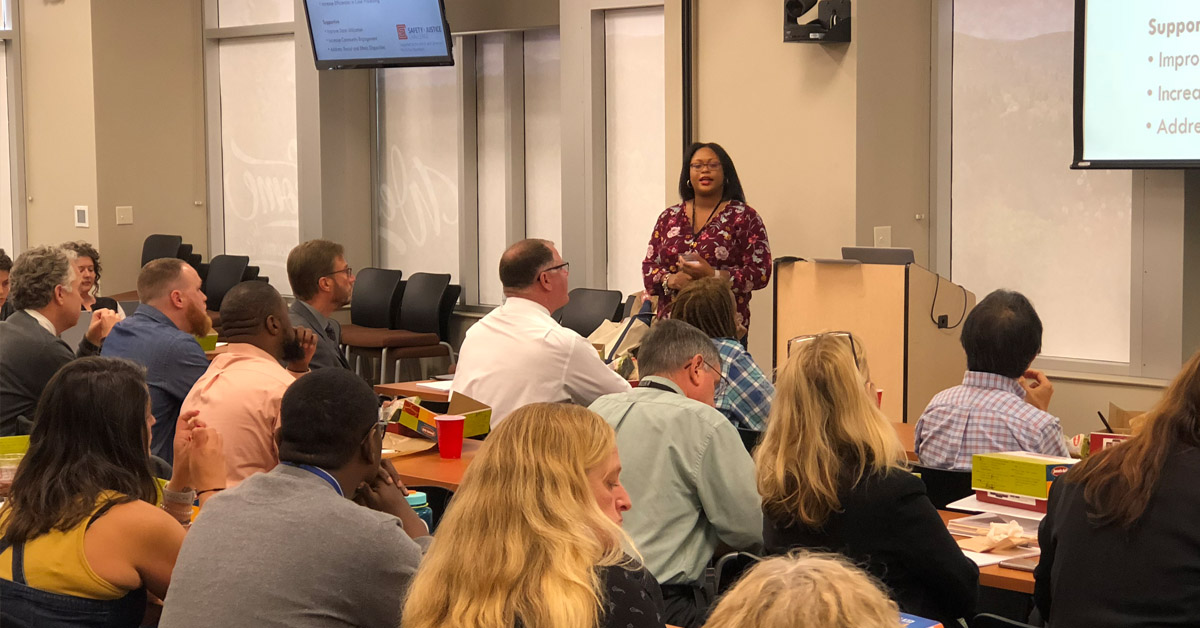This news item expired on Wednesday, June 26, 2019 so the information below could be outdated or incorrect.

On Oct. 25, 2018, over 60 criminal justice system and behavioral health leaders from area organizations including including Mission Health, Vaya Health and the Magistrate's Office, gathered to take on the next steps mapped out in a work session held in March of this year. Read more about that process, called Sequential Intercept Mapping (SIM), below in an article posted in April, 2018. This work complements the Safety & Justice Challenge.
Thanks to our elected officials that were present at the workshop, District Attorney Todd Williams, Chief Public Defender LeAnn Melton, Chief District Court Judge Calvin Hill, District Court Judge Susan “Smitty” Dotson-Smith, and Clerk of Court Steven Cogburn.
Stepping Up for Change: Buncombe County Tackles Mental Illness in Community and Jail
Originally published April 2018
Buncombe County provides several innovative approaches to better serve individuals with criminal justice involvement such as the formation of the Justice Resource Advisory Council and the Justice Resource Center (JRC), one of our County Commissioners’ strategic priorities.
The Justice Resource Advisory Council’s goal is to focus on an ongoing process of improving our local criminal justice system. That effort includes staying abreast of new best practices that could further bolster the mission of diverting people from jail by offering mental health, substance abuse, and other vital resources.
The Justice Resource Advisory Council is made up of local justice system leaders who come together for shared goal setting and coordination. The Justice Resource Advisory Council includes the District Attorney, Public Defender, a Representative from the Defense Bar, Clerk of Court, Chief District Court Judge, Resident Superior County Judge, the Sheriff, Police Chief, Adult Probation & Parole, Pretrial Services, Juvenile Justice, and Vaya Health as the management entity for mental health, substance abuse, and developmental services. The Justice Resource Advisory Council relies on research and best practices and regularly connects with industry experts including Justice Management Institute, Pretrial Justice Institute, Policy Research Associates, Vera Institute, and more.
To that end, the Justice Resource Advisory Council recently hosted a multiday work session that mapped our criminal justice and mental health services; an activity that helped us to identify potential gaps in service and inventory other resources that might not be fully utilized. The process, called Sequential Intercept Mapping (SIM), included more than 50 professionals from criminal justice, mental health, substance abuse, and other relevant professional disciplines.
“We are a resource rich community, with many services aimed to help individuals during a mental health and/or substance abuse crisis,” notes Tiffany Iheanacho, Justice Resource Coordinator, who provides staff support to the Justice Resource Advisory Council in its priorities including development and implementation of the JRC. “There are several areas in our system we identified as opportunities for improvement to ensure individuals are connected to the right services and to divert and deter future criminal justice involvement.”
The next step will be to review a formal report from the SIM process and coordinate with the Justice Resource Advisory Council on how to best implement recommendations. However, through brainstorming efforts from the work session, SIM workshop participates identified four potential action items:
- Collectively develop a plan for individuals who are high utilizers of community resources.
- Increase coordination and collaboration with supportive housing organizations.
- Improve data sharing across criminal justice, mental health and supportive service agencies.
- Improve coordination and services related to mental health and substance abuse crisis responses.
“The workshop provided a way for our community criminal justice leaders, mental health providers, and supportive services to increase coordination and ensure we are not duplicating services, target intervention strategies that divert individuals with behavioral health issues into treatment, and deter future criminal justice involvement,” adds Iheanacho.
Ultimately, the Justice Resource Advisory Council works collectively to examine potential improvements to the criminal justice system, sets priorities, makes recommendations, and guides their implementation opportunities. Objectives of the Justice Resource Advisory Council include:
- Produce and continually improve a comprehensive criminal justice plan that defines systemic goals and objectives, identifies areas of strength and weakness, and includes an action plan with timelines and evaluative aspects.
- Identify and initiate programs or strategies for improvements of the criminal justice system with system stakeholders through planning and collaboration to enhance public safety.
- Utilize evidence-based system planning, evaluation, and data-driven decision making to review costs and results related to justice activities, avoid duplicate spending, and prioritize the use of limited funds.
- Interconnect and possibly consolidate existing criminal justice groups, committees, and boards operating in Buncombe County to maximize and align efforts to ensure cohesive systemic planning.
- Address jail population management in a holistic manner that considers overuse of jail resources, pretrial justice reform, and disparities.
- Determine potential grant opportunities, identify eligible agencies and programs, and synchronize the grant application processes to amplify impact.
The workshop and SIM process were made possible through Buncombe County’s participation in the John D. and Catherine T. MacArthur Foundation’s Safety and Justice Challenge network with technical assistance from Policy Research Associates.
For more information regarding Buncombe County and Justice Resource Advisory Council initiatives related to the criminal justice system, please feel free to contact Tiffany Iheanacho at tiffany.iheanacho@buncombecounty.org.